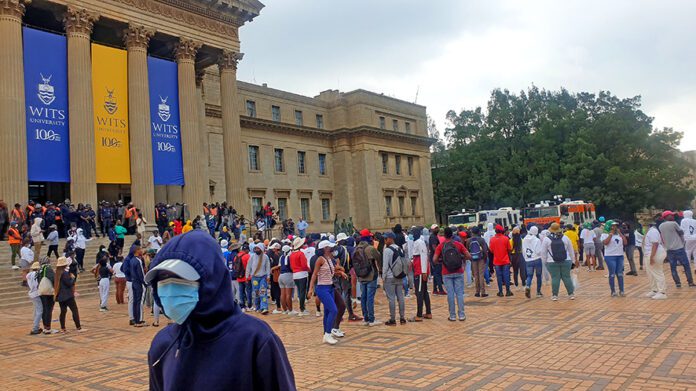Crisis after crisis. The students at the University of Witwatersrand (Wits) and University of Johannesburg (UJ) have over the past few days been staging protest marches for a variety of reasons, including the lack of water, with some students not having bathed for days, if not weeks.
Water is the source of human life, as the saying goes, and where people lack this resource, human existence as we know it, is negatively affected.
“We haven’t had water for three weeks. Jojo tanks are running low. If we can get the water (supply) that will be the end of one of our problems,” says Hlengiwe Xulu, SRC secretary at UJ.
There have been wide-ranging difficulties at our campuses, and these have stubbornly persisted over many years, if not decades, and there seems to be no end in sight.
As Xulu so poignantly puts it, water shortages are one of the many problems facing students. Not only in Johannesburg but countrywide, and it’s not only a reflection of universities’ incapacity, but casts poor light on weak governance at all levels, which has become the whole country’s inheritance.
Back to the students’ pertinent gripes.
The students’ complaints include unresolved NSFAS difficulties. In their own words, through the mouth of their own representative, Xulu, the students say: “The issue of NSFAS failing to give allowances to students. What are students eating? Going to school without having showered or eaten?”
The student protest at Wits is over the lack of accommodation and “exclusion from registration due to outstanding tuition fees”.
We should not minimise the extent of the problems. They are systemic, ingrained and require attention at all levels.
It also reminds us that genuine dialogue is required between students and university authorities. Any form of problem is societal, and by extension it means that to resolve it, there should be a meeting of minds. Where a meeting of minds fails, conflict persists.
We are not blind to the fact or lived reality that protest action is part of societal strategy to force protagonists to engage in round table conversations or dialogue. Besides, section 17 of the Bill of Rights of our Constitution states that “everyone has the right, peaceful and unarmed, to assemble, to demonstrate, to picket and to present petitions”.
It is a serious indictment on authority, across the board, that students could be forced into an untenable situation where they go without taking a bath for days.
Good sanitation is a necessity. Also true is that all institutions of learning should provide adequate accommodation to their students, and failure to do that amounts to an incongruity that defeats the purpose of learning.
Given all these considerations, we believe it would be more useful to minimise any form of violence or prospect of it.
We sympathise with the students’ cause, yet we do not think acts of violence or intimidation, which prevent others from exercising their rights to free movement, is tolerable.
We encourage dialogue and we strongly condemn acts of vandalism.
Follow @SundayWorldZA on Twitter and @sundayworldza on Instagram, or like our Facebook Page, Sunday World, by clicking here for the latest breaking news in South Africa. To Subscribe to Sunday World, click here



